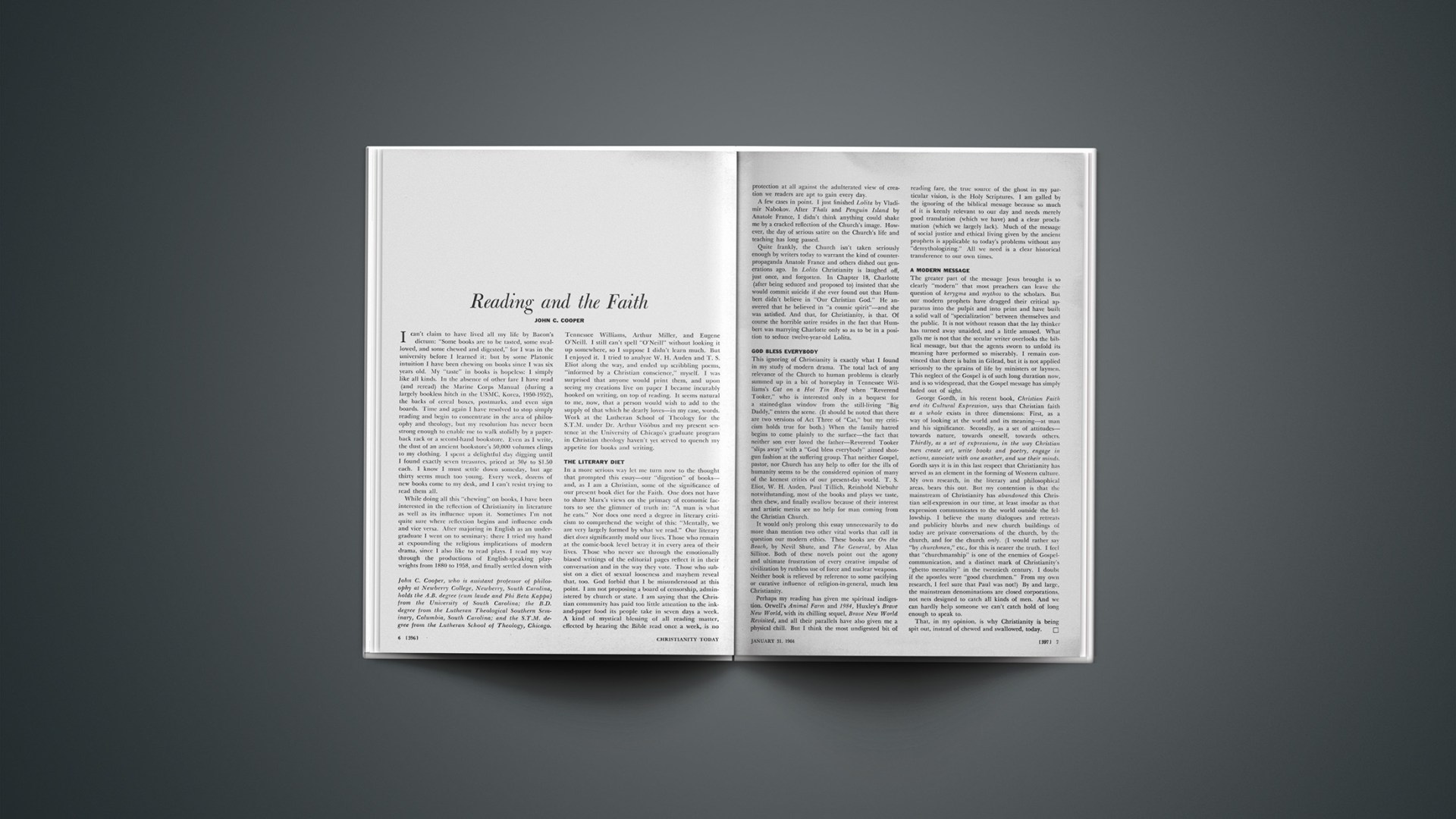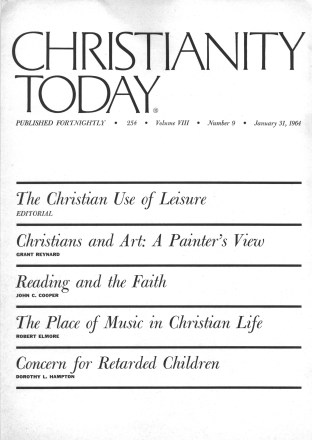I can’t claim to have lived all my life by Bacon’s dictum: “Some books are to be tasted, some swallowed, and some chewed and digested,” for I was in the university before I learned it; but by some Platonic intuition I have been chewing on books since I was six years old. My “taste” in books is hopeless: I simply like all kinds. In the absence of other fare I have read (and reread) the Marine Corps Manual (during a largely bookless hitch in the USMC, Korea, 1950–1952), the backs of cereal boxes, postmarks, and even sign boards. Time and again I have resolved to stop simply reading and begin to concentrate in the area of philosophy and theology, but my resolution has never been strong enough to enable me to walk stolidly by a paperback rack or a second-hand bookstore. Even as I write, the dust of an ancient bookstore’s 50,000 volumes clings to my clothing. I spent a delightful day digging until I found exactly seven treasures, priced at 30ȼ to $1.50 each. I know I must settle down someday, but age thirty seems much too young. Every week, dozens of new books come to my desk, and I can’t resist trying to read them all.
While doing all this “chewing” on books, I have been interested in the reflection of Christianity in literature as well as its influence upon it. Sometimes I’m not quite sure where reflection begins and influence ends and vice versa. After majoring in English as an undergraduate I went on to seminary; there I tried my hand at expounding the religious implications of modern drama, since I also like to read plays. I read my way through the productions of English-speaking playwrights from 1880 to 1958, and finally settled down with Tennessee Williams, Arthur Miller, and Eugene O’Neill. I still can’t spell “O’Neill” without looking it up somewhere, so I suppose I didn’t learn much. But I enjoyed it. I tried to analyze W. H. Auden and T. S. Eliot along the way, and ended up scribbling poems, “informed by a Christian conscience,” myself. I was surprised that anyone would print them, and upon seeing my creations live on paper I became incurably hooked on writing, on top of reading. It seems natural to me, now, that a person would wish to add to the supply of that which he dearly loves—in my case, words. Work at the Lutheran School of Theology for the S.T.M. under Dr. Arthur Vööbus and my present sentence at the University of Chicago’s graduate program in Christian theology haven’t yet served to quench my appetite for books and writing.
The Literary Diet
In a more serious way let me turn now to the thought that prompted this essay—our “digestion” of books—and, as I am a Christian, some of the significance of our present book diet for the Faith. One does not have to share Marx’s views on the primacy of economic factors to see the glimmer of truth in: “A man is what he eats.” Nor does one need a degree in literary criticism to comprehend the weight of this: “Mentally, we are very largely formed by what we read.” Our literary diet does significantly mold our lives. Those who remain at the comic-book level betray it in every area of their lives. Those who never see through the emotionally biased writings of the editorial pages reflect it in their conversation and in the way they vote. Those who subsist on a diet of sexual looseness and mayhem reveal that, too. God forbid that I be misunderstood at this point. I am not proposing a board of censorship, administered by church or state. I am saying that the Christian community has paid too little attention to the ink-and-paper food its people take in seven days a week. A kind of mystical blessing of all reading matter, effected by hearing the Bible read once a week, is no protection at all against the adulterated view of creation we readers are apt to gain every day.
A few cases in point. I just finished Lolita by Vladimir Nabokov. After Thaïs and Penguin Island by Anatole France, I didn’t think anything could shake me by a cracked reflection of the Church’s image. However, the day of serious satire on the Church’s life and teaching has long passed.
Quite frankly, the Church isn’t taken seriously enough by writers today to warrant the kind of counterpropaganda Anatole France and others dished out generations ago. In Lolita Christianity is laughed off, just once, and forgotten. In Chapter 18, Charlotte (after being seduced and proposed to) insisted that she would commit suicide if she ever found out that Humbert didn’t believe in “Our Christian God.” He answered that he believed in “a cosmic spirit”—and she was satisfied. And that, for Christianity, is that. Of course the horrible satire resides in the fact that Humbert was marrying Charlotte only so as to be in a position to seduce twelve-year-old Lolita.
God Bless Everybody
This ignoring of Christianity is exactly what I found in my study of modern drama. The total lack of any relevance of the Church to human problems is clearly summed up in a bit of horseplay in Tennessee Williams’s Cat on a Hot Tin Roof when “Reverend Tooker,” who is interested only in a bequest for a stained-glass window from the still-living “Big Daddy,” enters the scene. (It should be noted that there are two versions of Act Three of “Cat,” but my criticism holds true for both.) When the family hatred begins to come plainly to the surface—the fact that neither son ever loved the father—Reverend Tooker “slips away” with a “God bless everybody” aimed shotgun fashion at the suffering group. That neither Gospel, pastor, nor Church has any help to offer for the ills of humanity seems to be the considered opinion of many of the keenest critics of our present-day world. T. S. Eliot, W. H. Auden, Paul Tillich, Reinhold Niebuhr notwithstanding, most of the books and plays we taste, then chew, and finally swallow because of their interest and artistic merits see no help for man coming from the Christian Church.
It would only prolong this essay unnecessarily to do more than mention two other vital works that call in question our modern ethics. These books are On the Beach, by Nevil Shute, and The General, by Alan Sillitoe. Both of these novels point out the agony and ultimate frustration of every creative impulse of civilization by ruthless use of force and nuclear weapons. Neither book is relieved by reference to some pacifying or curative influence of religion-in-general, much less Christianity.
Perhaps my reading has given me spiritual indigestion. Orwell’s Animal Farm and 1984, Huxley’s Brave New World, with its chilling sequel, Brave New World Revisited, and all their parallels have also given me a physical chill. But I think the most undigested bit of reading fare, the true source of the ghost in my particular vision, is the Holy Scriptures. I am galled by the ignoring of the biblical message because so much of it is keenly relevant to our day and needs merely good translation (which we have) and a clear proclamation (which we largely lack). Much of the message of social justice and ethical living given by the ancient prophets is applicable to today’s problems without any “demythologizing.” All we need is a clear historical transference to our own times.
A Modern Message
The greater part of the message Jesus brought is so clearly “modern” that most preachers can leave the question of kerygma and mythos to the scholars. But our modern prophets have dragged their critical apparatus into the pulpit and into print and have built a solid wall of “specialization” between themselves and the public. It is not without reason that the lay thinker has turned away unaided, and a little amused. What galls me is not that the secular writer overlooks the biblical message, but that the agents sworn to unfold its meaning have performed so miserably. I remain convinced that there is balm in Gilead, but it is not applied seriously to the sprains of life by ministers or laymen. This neglect of the Gospel is of such long duration now, and is so widespread, that the Gospel message has simply faded out of sight.
George Gordh, in his recent book, Christian Faith and its Cultural Expression, says that Christian faith as a whole exists in three dimensions: First, as a way of looking at the world and its meaning—at man and his significance. Secondly, as a set of attitudes—towards nature, towards oneself, towards others. Thirdly, as a set of expressions, in the way Christian men create art, write books and poetry, engage in actions, associate with one another, and use their minds. Gordh says it is in this last respect that Christianity has served as an element in the forming of Western culture. My own research, in the literary and philosophical areas, bears this out. But my contention is that the mainstream of Christianity has abandoned this Christian self-expression in our time, at least insofar as that expression communicates to the world outside the fellowship. I believe the many dialogues and retreats and publicity blurbs and new church buildings of today are private conversations of the church, by the church, and for the church only. (I would rather say “by churchmen,” etc., for this is nearer the truth. I feel that “churchmanship” is one of the enemies of Gospel-communication, and a distinct mark of Christianity’s “ghetto mentality” in the twentieth century. I doubt if the apostles were “good churchmen.” From my own research, I feel sure that Paul was not!) By and large, the mainstream denominations are closed corporations, not nets designed to catch all kinds of men. And we can hardly help someone we can’t catch hold of long enough to speak to.
That, in my opinion, is why Christianity is being spit out, instead of chewed and swallowed, today.
John C. Cooper, who is assistant professor of philosophy at Newberry College, Newberry, South Carolina, holds the A.B. degree (cum laude and Phi Beta Kappa) from the University of South Carolina; the B.D. degree from the Lutheran Theological Southern Seminary, Columbia, South Carolina; and the S.T.M. degree from the Lutheran School of Theology, Chicago.










